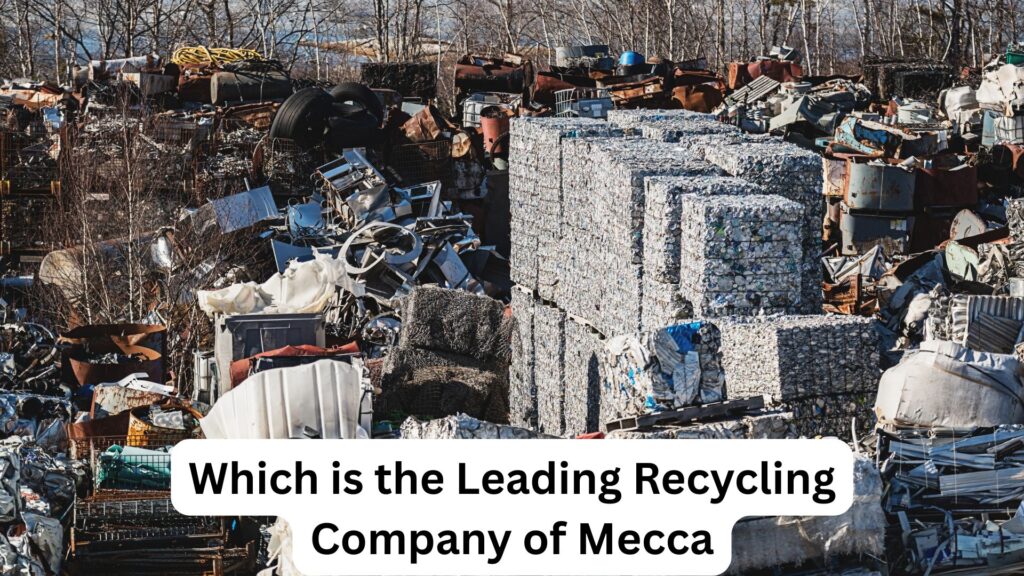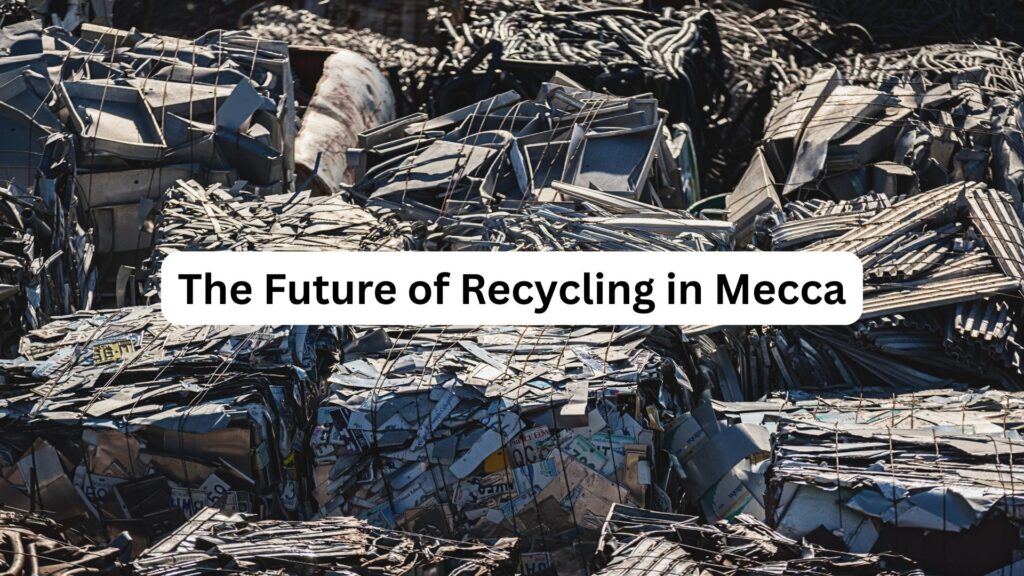Introduction
Recycling has become a cornerstone of sustainable development worldwide, and Mecca, the holiest city in Islam, is no exception. As the city continues to grow, the need for effective waste management and recycling solutions has become increasingly critical. This article will discuss which is the leading recycling company of Mecca, its role in the region, and the broader context of recycling in Saudi Arabia. We’ll also delve into the advantages and disadvantages of recycling, compare local and global recycling leaders, and discuss the future of recycling in Mecca.
The Importance of Recycling in Mecca
Mecca, home to millions of pilgrims annually, generates significant amounts of waste, including metal scraps, plastic scraps, and paper scraps. The city’s unique position as a religious and cultural hub necessitates innovative solutions to manage its waste sustainably. Recycling not only helps reduce the environmental impact of waste but also conserves natural resources and supports the local economy.
The Saudi government has been actively promoting recycling as part of its Vision 2030 initiative, which aims to diversify the economy and reduce reliance on oil. Recycling companies in Mecca play a vital role in achieving these goals by transforming waste into valuable resources.
Which is the Leading Recycling Company of Mecca?

image credits: canva.com
The leading recycling company in Mecca is the Saudi Investment Recycling Company (SIRC), a wholly-owned subsidiary of the Public Investment Fund (PIF) of Saudi Arabia. SIRC is at the forefront of the Kingdom’s efforts to build a sustainable waste management and recycling infrastructure.
Why is SIRC the Leading Recycling Company in Mecca?
- Comprehensive Services: SIRC handles a wide range of recyclable materials, including metal scraps, plastic scraps, and paper scraps. Its services span collection, sorting, processing, and recycling.
- Advanced Technology: The company employs state-of-the-art recycling technologies to maximize efficiency and minimize environmental impact.
- Strategic Vision: SIRC aligns with Saudi Arabia’s Vision 2030, focusing on sustainability, economic diversification, and environmental conservation.
- Government Backing: As a PIF subsidiary, SIRC benefits from strong government support, enabling it to undertake large-scale projects and initiatives.
Who is the CEO of Saudi Investment Recycling Company?
The CEO of SIRC is Eng. Ziyad Al-Shiha is a visionary leader with extensive experience in waste management and sustainability. Under his leadership, SIRC has implemented several groundbreaking projects aimed at transforming Saudi Arabia’s recycling industry. Eng. Al-Shiha’s commitment to innovation and sustainability has positioned SIRC as a leader not only in Mecca but across the Kingdom.
Global Leaders in Recycling: A Comparison
While SIRC is the leading recycling company in Mecca, it’s worth looking at global leaders in recycling to understand best practices and innovations. Some of the world’s top recycling companies include:
- Veolia Environnement (France): A global leader in waste management and recycling, Veolia operates in over 40 countries and focuses on circular economy solutions.
- Waste Management, Inc. (USA): The largest waste management company in North America, known for its advanced recycling technologies and landfill diversion programs.
- SUEZ (France): Another major player in the recycling industry, SUEZ specializes in water and waste management, with a strong emphasis on sustainability.
Similarities and Differences
- Similarities: Both SIRC and global leaders like Veolia and SUEZ prioritize sustainability, innovation, and efficiency. They also focus on recycling a wide range of materials, including metal, plastic, and paper.
- Differences: Global companies often have more extensive international operations and access to cutting-edge technologies. However, SIRC’s strong government backing and alignment with Vision 2030 give it a unique advantage in Saudi Arabia.
Advantages of Recycling Companies
Recycling companies like SIRC offer numerous benefits, including:
- Environmental Conservation: Recycling reduces the need for raw materials, conserves energy, and minimizes greenhouse gas emissions.
- Economic Growth: The recycling industry creates jobs and supports local businesses by providing raw materials at lower costs.
- Waste Reduction: Recycling diverts waste from landfills, reducing pollution and extending the lifespan of landfill sites.
- Resource Efficiency: Recycled materials like scrap metal, plastic, and paper can be reused multiple times, promoting a circular economy.
Disadvantages of Recycling Companies
Despite their benefits, recycling companies face several challenges:
- High Operational Costs: Setting up and maintaining recycling facilities requires significant investment.
- Contamination Issues: Improper sorting of recyclable materials can lead to contamination, reducing the quality of recycled products.
- Limited Public Awareness: Many people are still unaware of the importance of recycling, leading to low participation rates.
- Technological Barriers: Advanced recycling technologies can be expensive and difficult to implement, especially in developing regions.
Types of Recycling Services in Mecca
Recycling companies in Mecca offer a variety of services, including:
- Metal Scrap Recycling: Recycling metal scrap reduces the need for mining and conserves natural resources. Common metals recycled include aluminum, copper, and steel.
- Plastic Scrap Recycling: Plastic recycling helps reduce plastic pollution and promotes the use of recycled plastics in manufacturing.
- Paper Scrap Recycling: Recycling paper scrap saves trees and reduces water and energy consumption in paper production.
The Future of Recycling in Mecca

image credits: canva.com
The future of recycling in Mecca looks promising, thanks to the efforts of companies like SIRC and the Saudi government’s commitment to sustainability. Key trends and initiatives include:
- Smart Waste Management: The use of IoT and AI to optimize waste collection and recycling processes.
- Circular Economy Models: Promoting the reuse and recycling of materials to create a closed-loop system.
- Public Awareness Campaigns: Educating the public about the importance of recycling and how to participate effectively.
- Partnerships with Global Leaders: Collaborating with international recycling companies to share knowledge and best practices.
Conclusion: Supporting Recycling in Mecca
Recycling is essential for building a sustainable future, and Mecca’s leading recycling company, SIRC, is at the forefront of this effort. By recycling metal scraps, plastic scraps, and paper scraps, we can conserve resources, protect the environment, and support the local economy.
If you’re looking to contribute to Mecca’s recycling efforts, consider partnering with SIRC or other local recycling companies. Together, we can make a difference and ensure a cleaner, greener future for generations to come.
FAQs
1. What is the leading recycling company of Mecca?
The leading recycling company in Mecca is the Saudi Investment Recycling Company (SIRC). SIRC is a subsidiary of the Public Investment Fund (PIF) and plays a pivotal role in managing waste and promoting recycling in the region. It specializes in recycling metal scraps, plastic scraps, and paper scraps, aligning with Saudi Arabia’s Vision 2030 sustainability goals.
2. What services does the Saudi Investment Recycling Company (SIRC) offer?
SIRC offers a wide range of recycling services, including:
- Metal Scrap Recycling: Processing metals like aluminum, copper, and steel for reuse.
- Plastic Scrap Recycling: Transforming plastic waste into reusable materials.
- Paper Scrap Recycling: Recycling paper products to conserve resources and reduce deforestation.
- Waste Management Solutions: Comprehensive waste collection, sorting, and processing services.
3. Who is the CEO of the Saudi Investment Recycling Company (SIRC)?
The CEO of SIRC is Eng. Ziyad Al-Shiha. Under his leadership, SIRC has implemented innovative recycling projects and contributed significantly to Saudi Arabia’s sustainability efforts. His vision and expertise have positioned SIRC as a leader in the recycling industry.
4. How does recycling benefit Mecca and its environment?
Recycling offers numerous benefits for Mecca and its environment, including:
- Reducing Waste: Diverting metal, plastic, and paper scrap from landfills.
- Conserving Resources: Saving natural resources like trees, water, and minerals.
- Lowering Carbon Emissions: Reducing greenhouse gas emissions by minimizing the need for raw material extraction.
- Economic Growth: Creating jobs and supporting local industries through recycled materials.
5. What are the challenges faced by recycling companies in Mecca?
Recycling companies in Mecca face several challenges, such as:
- High Operational Costs: Establishing and maintaining recycling facilities requires significant investment.
- Contamination Issues: Improper sorting of recyclables can reduce the quality of recycled materials.
- Limited Public Awareness: Many residents and businesses are unaware of the importance of recycling.
- Technological Barriers: Implementing advanced recycling technologies can be costly and complex.
